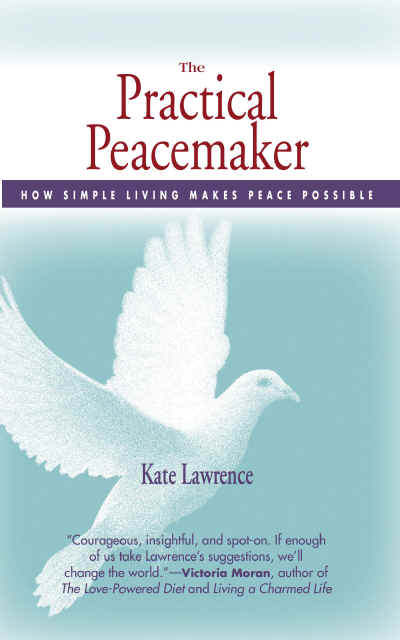Zen student Kate Lawrence shares her thoughts on how to live more simply, and therefore peacefully. In her letter:
“Simple living involves 3 things. First, we must use less of the world’s resources. This doesn’t mean deprivation, but noticing the waste and over-consumption we have come to consider normal—and instead, forming habits that will free up more resources for people elsewhere in the world. Second, we need to open up time in our daily schedules. No one can act peacefully when rushing around, feeling frustrated, trying to do more than is possible or even advisable. Third, we need to pay attention to the present—something I discuss in the following excerpt from my book, The Practical Peacemaker: How Simple Living Makes Peace Possible [Lantern Books]:
Simple living means paying attention to our ordinary lives moment by moment, being present in the here and now. Fortunately, for our happiness, it is not really possible to live in the past or the future, but we constantly do this in our minds. When we think about the past, we mostly dwell on our regrets or disappointments; when we think about the future, we are often caught up in anxiety or fear. Such thinking keeps our attention away from being able to listen, speak and act in ways that bring more clarity to the situation right in front of us.
We may miss great opportunities if we do not keep our attention in the present, and try to do good right where we find ourselves instead of being lost in the past or the future. Questions we can ask about our focus are these: Am I present in my life most of the time, or am I often fantasizing about the future, daydreaming, or going over past events? Do I pay enough attention to be open to helping the person with me right now?
Daniel Goleman, psychologist and author of the bestselling Emotional Intelligence and Social Intelligence, speaks of paying attention as a way to be more fully compassionate: “The first step in compassion is to notice the other’s need . . . the enemy of compassion is preoccupation with the self.” Noticing others’ needs has for most of us become less likely to happen, because we have become increasingly distracted by busyness, ubiquitous entertainment and other material pursuits. Efforts to focus our attention through meditation have been criticized by some people as too self-indulgent, benefitting no one except possibly the meditator. From the standpoint of recent discoveries in neuroscience, however, Goleman offers a practical answer to this objection. Our meditative calmness can actually help others, he says, “not just in some metaphorical way, but actually, in hard scientific terms . . . If you have a loved one who is suffering, and you yourself are calm, equanimous and loving, your presence is going to help them. It’s more than just a nice thing to do; it’s an effective thing to do.”
We also need to notice when our attention goes outward in wanting—for example, in greed or attachment to something we perceive as pleasurable—and when our attention turns inward in avoidance or aversion to something we perceive as threatening or painful. These responses destroy peace and prevent us from experiencing the present moment calmly and fully.
We can learn to be more alert when we find ourselves daydreaming or worrying, desiring or rejecting, so as not to be carried away by these thoughts. They’re just thoughts passing through, and we need to let them pass through rather than reaching out, grasping and exploring them, arranging them in sequence, feeding on them, trying to make desired results happen, and warding off undesired ones. This is not to say that we never plan for the future nor review and learn from what happened in the past, but that we are wise to limit the time we spend inside our heads, somewhere other than in the present moment.
Dogen, a famous 13th century Japanese Zen master, wrote:
Above all, don’t wish to become a future Buddha;
Your only concern should be,
As thought follows thought,
To avoid clinging to any of them.
Thanks, Kate, for the reminder to be here rather than heady.


More and more I find that the number one way to live peacefully is Kate's step number 2: be less busy by making more time. I often struggle against my own egoism in this respect, believing "I can handle taking on a lot because I have a meditation practice" as if my practice and my life are something seperate. I also think that our culture is gripped by the equation of busyness with success and idleness with sin, which can make it very hard to resist over-committing ourselves. I constantly over-commit and then wonder why my grounded practice flew the coop.
Daniel Goleman is correct when he said that our meditation practice helps others. As someone who works in a emergency dept, I can tell you that my meditation practice has helped me remain calm and present in my care for my patients as well as providing care for my elderly parents. And they sense that too and tell me that I have such a reassurance presence that they felt more at ease. Making the task at hand more possible. So I make time every day and sit and give myself and others the present moment.
My thing seems to be, I'm a 'responsible workaholic." I work til I feel it's done RIGHT. For me, simplicity is about stepping back from perfectionism, accepting my humanness.